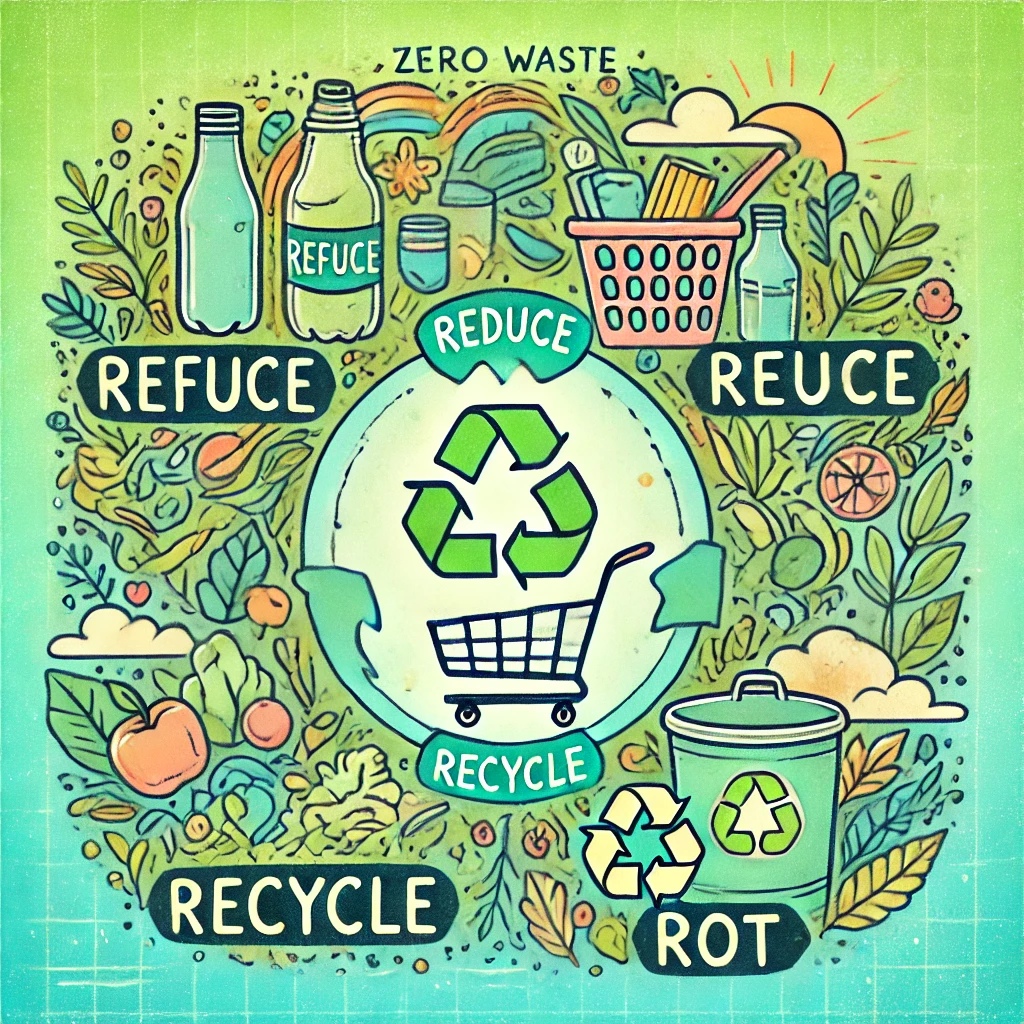
Sustainable Living and Eco-Friendly
How to Achieve Zero Waste Management in India


DINKAR
11/8/2024
How to Achieve Zero Waste Management in India
Introduction
India, with its vast population and rapid urbanization, faces a massive waste management challenge. Urban India generates over 62 million tons of waste annually, most of which ends up in landfills, polluting the land, water, and air. As these landfills fill up, cities and rural areas alike feel the strain of mounting waste. A zero-waste approach, which emphasizes waste reduction, reuse, recycling, and sustainable disposal practices, could be the key to managing India’s waste problem. Achieving zero-waste management in India is both challenging and necessary, and this article explores effective strategies for making it a reality.
Understanding Zero-Waste Management
Zero-waste management is a holistic approach that seeks to eliminate waste at every stage of its lifecycle, from production to disposal. It emphasizes sustainable practices, waste minimization, and maximizing resource recovery. The ultimate goal is to reduce waste to zero, meaning nothing goes to landfills or incinerators. Achieving zero waste means rethinking how we produce, consume, and dispose of products to create a sustainable and circular economy.
The Importance of Zero-Waste Management in India
India’s waste management crisis impacts the environment, public health, and economic stability. The benefits of adopting zero-waste practices in India include:
- Reduced Pollution: Decreased reliance on landfills and incinerators reduces air and groundwater pollution.
- Resource Conservation: By reusing and recycling, valuable resources are conserved, reducing the need for raw materials.
- Economic Benefits: Waste management can generate jobs and foster a circular economy that promotes local industries.
- Health Improvements: Reduced waste disposal in open dumps can lower the prevalence of diseases caused by toxic pollutants.
Challenges to Achieving Zero Waste in India
While a zero-waste approach is desirable, India faces unique challenges that require tailored solutions:
- Population Density: High population density, especially in urban areas, creates large volumes of waste daily, making efficient waste management difficult.
- Lack of Infrastructure: Many cities and rural areas lack proper waste collection, segregation, and recycling facilities.
- Public Awareness: A significant portion of the population is unaware of sustainable waste management practices, and behavioral changes are slow.
- Informal Waste Sector: The informal waste sector handles a large percentage of waste collection and recycling but operates with limited resources, often in unsafe conditions.
- Policy Gaps and Enforcement Issues: Although India has policies like the Solid Waste Management Rules, 2016, enforcement is often weak, especially at the municipal level.
Strategies for Achieving Zero-Waste Management in India
Despite these challenges, a systematic approach and collaborative efforts can help India work toward zero-waste management. Here are some key strategies:
1. Implement Effective Waste Segregation at Source
Segregation of waste into biodegradable, recyclable, and hazardous categories at the source (households, institutions, and businesses) is crucial. Segregated waste allows for efficient recycling and reduces contamination. Local governments, NGOs, and social enterprises can conduct awareness campaigns to educate the public on proper segregation practices.
2. Strengthen Waste Collection and Recycling Infrastructure
An effective waste management system requires robust infrastructure for waste collection, transportation, and recycling. India needs to invest in:
- Recycling Plants: For processing paper, plastic, metal, and electronic waste.
- Composting Units: To handle organic and biodegradable waste, turning it into compost for agricultural and horticultural use.
- Biogas Plants: To convert organic waste into energy, reducing dependence on fossil fuels.
3. Promote Composting and Biogas Generation
Organic waste makes up a significant portion of India’s total waste. Promoting decentralized composting (such as home or community composting) can reduce the amount of organic waste sent to landfills. Similarly, biogas plants can process food and animal waste to produce renewable energy, which can be used for cooking or electricity.
4. Empower and Integrate the Informal Sector
India’s informal waste sector, including waste pickers and recyclers, plays a critical role in waste collection and recycling. Recognizing, formalizing, and providing support to these workers can improve waste management efficiency while creating safe, dignified jobs. Municipal bodies and NGOs can work together to organize training and support initiatives for informal workers.
5. Enforce and Strengthen Policy Frameworks
Policies such as the Solid Waste Management Rules (2016) provide guidelines for waste segregation, composting, and recycling. However, strict enforcement of these policies at the municipal level is essential. Regular monitoring, penalties for non-compliance, and incentives for adherence can encourage better waste management practices.
6. Encourage Extended Producer Responsibility (EPR)
EPR mandates that producers take responsibility for the disposal of their products at the end of their lifecycle. By involving producers in waste management, particularly for plastics and electronic waste, EPR reduces the burden on municipalities. Encouraging companies to invest in eco-friendly packaging and waste take-back schemes can be a powerful step toward zero waste.
7. Encourage Minimalism and Sustainable Consumption
Public awareness campaigns can encourage consumers to adopt a minimalist lifestyle, reducing waste generation by avoiding unnecessary purchases and opting for reusable items. Businesses can promote sustainable products, encouraging consumers to make eco-friendly choices.
8. Invest in Zero-Waste Technology and Innovation
Innovative waste management solutions, like waste-to-energy technology, upcycling, and advanced recycling techniques, can help manage waste more effectively. India can encourage startups and companies to develop zero-waste technology through grants and funding. For example, app-based solutions can connect consumers with local recyclers and composting centers, making waste disposal easier.
Role of Individuals, Communities, and Businesses in Zero-Waste Management
Achieving zero waste requires a collaborative effort from all sectors of society. Here’s how each group can contribute:
- Individuals: Practice waste segregation, adopt composting, reduce plastic usage, and choose reusable products.
- Communities: Participate in local clean-up drives, set up community composting units, and organize zero-waste workshops.
- Businesses: Implement green practices, such as using sustainable packaging, reducing waste generation, and supporting EPR initiatives.
- Educational Institutions: Educate students on zero-waste practices and implement waste segregation and composting within school campuses.
Success Stories and Case Studies
- Pune’s Waste Picker Integration: Pune has effectively integrated waste pickers into the formal waste management system, providing them with identity cards and support from the local government. This initiative has improved waste collection efficiency and ensured waste pickers’ well-being.
- Zero-Waste Villages in Sikkim: Several villages in Sikkim have adopted zero-waste practices, using composting, recycling, and community clean-ups to manage waste sustainably. These villages serve as models for other regions.
- Plastic Ban in Maharashtra: Maharashtra’s plastic ban has helped reduce plastic waste generation, encouraging residents and businesses to find sustainable alternatives.
Conclusion
Achieving zero-waste management in India is challenging but possible with the right approach and dedication from all sectors of society. By promoting sustainable waste practices, investing in infrastructure, and strengthening policy enforcement, India can reduce its reliance on landfills and incinerators, creating a cleaner and healthier environment. Embracing zero-waste principles will not only protect natural resources but also pave the way for a sustainable, circular economy that benefits people, communities, and the planet.